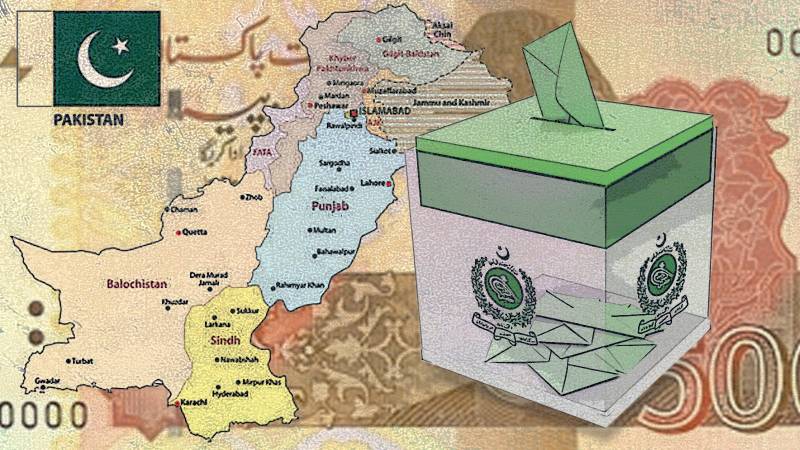
Analysts delving into Pakistani politics often find themselves grappling with a sense of frustration. This frustration is rooted in the very real concerns stemming from the overwhelming influence exerted by a select group of privileged families over the nation's economy. Their pervasive presence in the political arena further compounds the issue, as these families harbor interests in both autocratic and democratic regimes. For them, politics is akin to a high-stakes game where they consistently maintain the upper hand.
Although elite-driven politics may be perceived as successful, it often comes at the expense of the public interest. A select group of 220 influential families in politics and 33 corporate entities controlling businesses effectively holds the public hostage to their parochial agenda. The belief in maintaining the equilibrium of power has contributed to averting major internal uprisings.
Pakistan's well-documented challenges are met with a playbook of established strategies. These strategies include raising interest rates to combat inflation, devaluing the currency to address trade deficits, and securing loans to fund crucial infrastructure projects. Yet, a recurring theme emerges when it comes to taxation: the privileged class consistently benefits from exemptions, a practice ingrained over time.
It appears that political parties often engage in electoral exercises primarily to negotiate loan agreements with international financial institutions. These agreements are signed without hesitation to bolster the economy, often at the expense of sectional interests.
In times of political impasse, a figure from the same privileged class had often emerged as a harbinger of change, capturing the public's imagination. This individual had embarked on a new political drama, marked by grand public rallies, protracted marches, and, at times, episodes of mob violence. However, once this newfound party had secured power with popular support, it frequently shut the door behind it, leaving the public yearning for another savior
Pakistan's well-documented challenges are met with a playbook of established strategies. These strategies include raising interest rates to combat inflation, devaluing the currency to address trade deficits, and securing loans to fund crucial infrastructure projects.
For example, The Pakistan Peoples Party (PPP), initially founded on socialist principles, eventually transformed into guardians of feudal interests. Similarly, the Pakistan Muslim League-Nawaz (PML-N), nurtured during a period of dictatorship, evolved into vocal proponents of capitalist interests.
The Pakistan Tehreek-e-Insaf (PTI) ascended to power with promises of prioritizing the people's welfare. Throughout its over three-year tenure, it championed the mantra of change, despite a questionable track record on critical public issues. Interestingly, the PTI's policies appeared to favor the elite, while adamantly refusing to grant National Reconciliation Ordinance (NRO) concessions to former ruling parties.
While the political landscape in Pakistan has occasionally appeared stagnant and embroiled in instability, these moments of despair have often proven to be temporary. The nation has shown a tendency to revert to its familiar patterns, much like a ship finding its course in the doldrums
However, history has shown that complacency can have dire consequences, as exemplified by the catastrophic Fall of Dhaka. These stark reminders emphasize that circumstances can spiral out of control, defying our best calculations and leading to perilous outcomes.
Notwithstanding the constitutional provisions for politically, administratively, and financially autonomous local governments, the benefits of democracy frequently elude the common populace.
Setting aside public sentiment, it's crucial to recognize that politics remains indispensable for Pakistan's national survival and sovereignty. Whether it pertains to economic revitalization or ensuring socio-political stability to attract investment, politics serves as the conduit to progress.
This raises a crucial question: are we simply following a predetermined script? Beyond economic woes, bureaucratic inertia poses a significant roadblock. The nation's administrative apparatus is ensnared in chaos, marked by a distinct lack of visionary leadership within the political hierarchy.
Although good governance should be the foremost goal, it often seems that preserving the delicate balance of power takes precedence. As a result, issues such as oppression, corruption, and nepotism pervade various facets of society, with loyalty to power often superseding the fulfillment of duty.
For sustainable growth while coexisting with democracy, returning power to the people and devolving authority to the grassroots level is imperative. Regional connectivity assumes paramount importance in enhancing consumer purchasing power and asserting relevance on the global stage.
Ironically, even after fifteen years of democratic restoration, a colonial-era mindset continues to cast a shadow over Pakistan's politics. This mindset is evident in the regressive tax regime and the reluctance to modernize the colonial-era criminal code of procedure.
Notwithstanding the constitutional provisions for politically, administratively, and financially autonomous local governments, the benefits of democracy frequently elude the common populace. Courts have compelled federal units to fulfill their constitutional responsibilities, yet they have only managed to establish paralyzed structures.
Pakistan stands at a critical juncture, faced with the choice of transforming into an organized and disciplined society guided by universal principles of peace and harmony or succumbing to anarchy fueled by suspicion, greed, and fear. Despite enduring scores of challenges, the Land of the Pure retains the capacity to shape its destiny, provided the nation addresses the intellectual confusion within its ranks, thereby paving the path toward a clear sense of purpose and a rightful place in the global arena.

